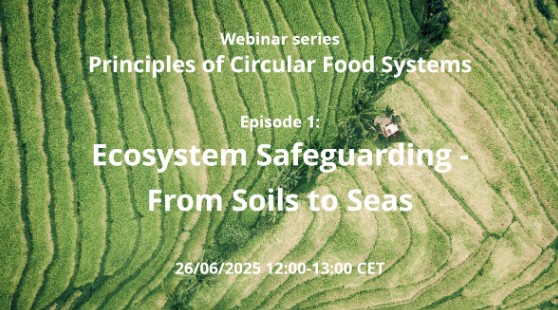The GRA-IRG Circular Food Systems network aims to develop an active international network of researchers in the field of circular food systems, where knowledge can be shared and collaboration between research groups can increase the development and implementation of circularity withing the agri-food system.
In circular food systems losses of raw materials in the production of biomass are kept to a minimum by pursuing a closed-loop in which all produced biomass is utilised to a maximum extent. It is a whole-system approach that looks at the individual parts of the food system as elements of an integrated entity. Such a food system approach is more than the sum of its parts as interaction between the different parts of the food system results in additional resource efficiency.
Circular Food Systems (CFS) may contribute to increased food security and reduction of GHG emissions by increasing the resource security (use of waste streams reduces need for inputs e.g. land, water, fossil energy and nitrogen and phosphorus as mineral fertilizer), and by mitigating the net greenhouse effect of emissions from CO2, N2O and CH4 during the different stages of the food systems both via direct mitigation interventions such as reduction of methane emissions and indirect mitigation interventions such as through additional carbon sequestration in soils and biomass. The benefits resulting from circular food systems go beyond mitigation of GHG-emissions and food security, but may also include increased biodiversity, and development of opportunities for ecosystem services.
Objectives of the network
The objectives of the network are:
- To contribute to food security with mitigation of GHG emissions by circularity across the entire agri-food system
- Bring together, develop and disseminate knowledge about the concept of circularity in food system across the world, and how it can contribute to GHG mitigation
- Provide coordination for international collaboration on research and design of (region specific) circular food systems
- Provide policy-makers with strategies how to implement circular food systems, based on proven technologies and system designs.
Network Activities
During the AgriGHG 2024 Symposium in Berlin, the Circular Food Systems Network hosted a dynamic 3D-modelling workshop. Participants used building blocks, toy animals, and clay to visualize both the current and future agrifood systems, identifying key challenges and opportunities for circular transformation.
We’re excited to announce that the insights and outcomes from this workshop have now been captured in a dedicated document. This resource highlights stakeholder perspectives on policy priorities, research needs, and practical steps toward more sustainable food systems.
Open Call for Proposals!
The Real Impact of Circularity: Benefits Beyond Metrics
The Circular Food Systems Network invites proposals for projects that explore and surface the value of circularity through innovative approaches—beyond measurements. We seek projects that highlight the broader benefits of circular practices, addressing their role in climate resilience, social systems, and local food economies.
This call is not about developing new metrics or producing traditional reports. It is about finding ways to monitor, communicate, facilitate, and demonstrate the values of circular practices beyond metrics for policy, practice, and community-level impact.
€30,000 in Funding | Issued by the Circular Food Systems Network
Deadline: 18/07/2025 | Contact: [email protected]
Webinar Series: The Principles of Circular Food Systems

The Principles of Circular Food Systems – Live Conversations
Join us for an engaging, podcast-style session where we dive deep into the core principles of circular food systems—not through formal presentations, but through dynamic conversations, critical questions, and multiple expert perspectives. Think of it as a live talk show on the future of circular food systems.
🎧 Episode 1: Ecosystem Safeguarding – Land and Water Perspectives
Date: 26/06/2025 12:00-13:00 CET
Location: Online (free registration below)
In this opening session, we explore how to protect the ecosystems that underpin our food systems—from soils to seas.
Whether you’re a researcher, policymaker, food system innovator, or just curious about the future of circular food systems, this series is for you.
Featuring Special Guests:
- Patrick Worms – Senior Science Policy Advisor, CIFOR-ICRAF & President
of the International Union of Agroforestry - Anne-Jo van Riel – Aquaculture and Fisheries Research Officer,
Wageningen University & Research (WUR); PhD on aquaculture’s role in
circular food systems
For more information and to register for the webinar, CLICK HERE.
Further reading:
van Loon, M.P., Hijbeek, R., Vonk, W.J., Oenema, J. (2024). Nutrient cycling on dairy farms in the Netherlands: The role of farm structure, management and trade-offs. Resources, Conservation and Recycling, Volume 211, 107875
Braamhaar, D.J.M., Pellikaan, W.F., List, D., Korir, D., Tanga, C.M., Oosting, S.J. (2025). Defatted black soldier fly larvae meal as a substitute of soybean meal in dairy cow diets. Animals, Volume 19, Issue 4, 101476
de Boer, I.J.M. and van Ittersum, M.K. (2018). Circularity in agricultural production. Mansholt lecture, 19 September 2018, Brussels, Wageningen University & Research, 71 pp.
Van Zanten, H.H.E., Van Ittersum, M.K., De Boer, I.J.M. (2019). The role of farm animals in a circular food system. Global Food Security, Volume 21, Pages 18-22
Contact
For more information on the Circular Food Systems Network, please contact [email protected].
